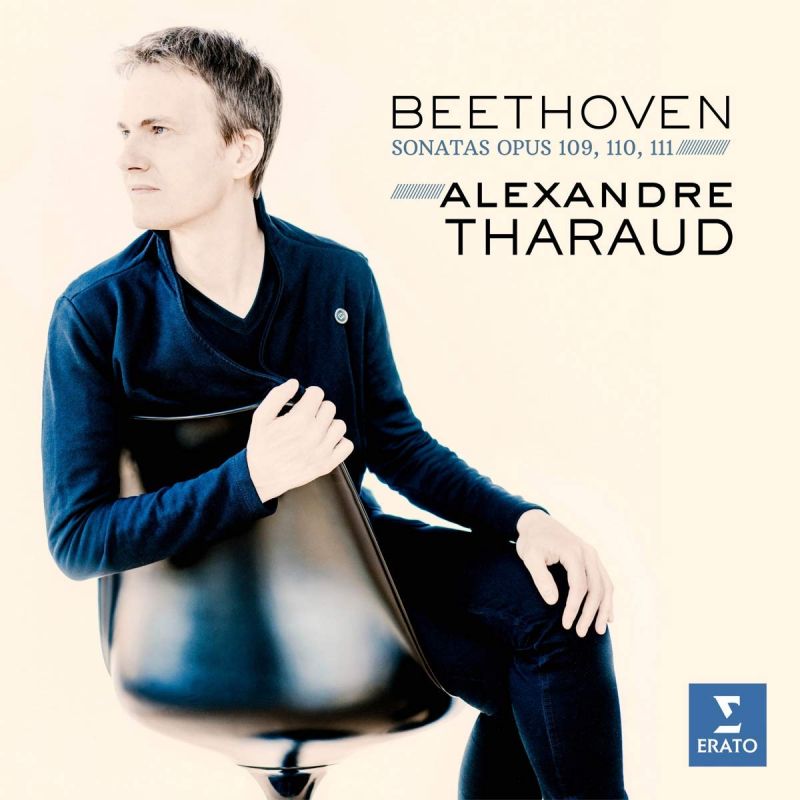BEETHOVEN Piano Sonatas, Opp 109-111 (Alexandre Tharaud)
View record and artist detailsRecord and Artist Details
Composer or Director: Ludwig van Beethoven
Genre:
Instrumental
Label: Erato
Magazine Review Date: 10/2018
Media Format: CD or Download
Media Runtime: 0
Mastering:
DDD
Catalogue Number: 90295 63382

Tracks:
| Composition | Artist Credit |
|---|---|
| Sonata for Piano No. 30 |
Ludwig van Beethoven, Composer
Alexandre Tharaud, Piano Ludwig van Beethoven, Composer |
| Sonata for Piano No. 31 |
Ludwig van Beethoven, Composer
Alexandre Tharaud, Piano Ludwig van Beethoven, Composer |
| Sonata for Piano No. 32 |
Ludwig van Beethoven, Composer
Alexandre Tharaud, Piano Ludwig van Beethoven, Composer |
Author: Harriet Smith
He brings to Op 109’s opening movement a suitable effortlessness, contrasting a billowing airiness with a steelier approach to the recitative-like writing. One of Tharaud’s stylistic traits is clarity of fingerwork and that is certainly much in evidence in the brief Prestissimo Scherzo, but I found the accentuation somewhat underwhelming, which lessened the sense of contrast that musicians such as Kovacevich and Annie Fischer find. On the other hand, Tharaud brings to the theme on which the finale variations are based a solemnity without sounding portentous, the following variations by turn poised (No 1) and energetic (No 3), with the fugal writing of No 5 clearly etched. But the closing moments of the sonata don’t reach the transcendental state of, say, Uchida.
The same traits come through in the remaining two sonatas. To generalise, Tharaud is most convincing in the more moderately tempered music: he imbues the first movement of Op 110 with a refreshing airiness but the second (Allegro molto) is slightly careful-sounding, the rough edges sanded smooth. How much more drive Uchida finds here without ever resorting to ugliness. Whereas she has you hanging on her every note, Tharaud sounds as if he’s still feeling his way in this repertoire. The following Adagio is beautifully shaded, and when the fugue enters he gives it a Bachian feel, molto legato, pacing the build-up to the climax well. But as the emotional temperature hots up, Tharaud can’t find the necessary edge of desperation.
That is true of the first movement of Op 111 too, whose opening misses the vital tension that makes Bavouzet’s version stand out, with his grandeur of vision in the Maestoso and a mightiness of intent in the following Allegro. Tharaud’s Arietta theme is, on the other hand, tenderly given, and I liked his sense of growth as the variations develop. I was, however, slightly surprised he didn’t make more of the anarchically jazzy third one, though the high-lying writing in the fourth is given an iridescent glow. And yet, as the trilling travels ever higher up the keyboard, it’s not as ethereal in effect as the finest, Uchida and Levit both extraordinarily intense by comparison. While Tharaud’s quiet coda is suitably valedictory, it doesn’t feel as if he has travelled as far as some in this work.
Discover the world's largest classical music catalogue with Presto Music.

Gramophone Digital Club
- Digital Edition
- Digital Archive
- Reviews Database
- Full website access
From £8.75 / month
Subscribe
Gramophone Full Club
- Print Edition
- Digital Edition
- Digital Archive
- Reviews Database
- Full website access
From £11.00 / month
Subscribe
If you are a library, university or other organisation that would be interested in an institutional subscription to Gramophone please click here for further information.




